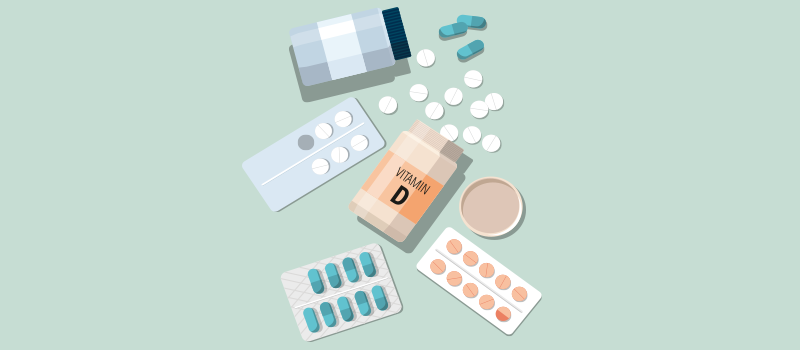What’s the Buzz
The Bee Healthy Blog
Vitamin K Deficiency Symptoms & Treatments

Vitamin K is an essential fat-soluble vitamin that plays a vital role in blood clotting. It is used by the body to make proteins called clotting factors that help to control bleeding by forming blood clots. This vitamin is also important for bone health, brain function, and cardiovascular health.
A vitamin K deficiency is rare in healthy adults. This vitamin is easily obtained from dietary sources such as green leafy vegetables, soybean, grains, and canola oils. Bacteria in the gut also produce vitamin K. However, sometimes vitamin K deficiency occurs in newborn babies and causes life-threatening bleeding complications. Please continue reading to learn more.
What is the most common cause of vitamin K deficiency?
Possible causes and risk factors for vitamin K deficiency include:
- Genetic factors (an inherited deficiency)
- Liver disease
- Diseases of the bile ducts and biliary tract that impair fat absorption
- Gastrointestinal disorders that result in fat malabsorption
- Medical conditions such as myeloma, leukemia, nephrotic syndrome, polycythemia vera, cystic fibrosis, and disseminated intravascular coagulation
- Weight loss surgery
- Massive blood transfusion
- Malnutrition
- A very low-fat diet (fat is required for vitamin K absorption from the gastrointestinal tract)
- Excessive use of mineral oil
- Taking certain medications, such as anti-TB drugs (rifampin, isoniazid), drugs used to treat high cholesterol (cholestyramine), weight loss drugs (orlistat), anti-seizure drugs (barbiturates), certain antibiotics, and drugs used to treat pain, fever, and inflammation (salicylates)
Who is at risk of vitamin K deficiency?
A person of any age can develop a vitamin K deficiency. However, newborn infants are at a particularly high risk of developing vitamin K deficiency. This is because vitamin K does not reach the fetus through the umbilical cord. Also, a newborn baby’s body does not make enough vitamin K from bacteria in the gut. Additionally, breast milk does not contain a sufficient amount of vitamin K.
What happens to babies with a vitamin K deficiency?
Babies with a vitamin K deficiency are at an increased risk of excessive bleeding. However, vitamin K deficiency bleeding (VKDB) is rare nowadays because every newborn infant is routinely given a prophylactic (preventive) vitamin K injection at birth. Babies who do not receive this injection and are exclusively breastfed are at a high risk of vitamin K deficiency.
What disease is caused by a lack of vitamin K?
A lack of vitamin K causes hemorrhagic disease (bleeding complications).
What are 4 signs of vitamin K deficiency?
The main symptom of vitamin K deficiency is bleeding. This can manifest as:
- Excessive bleeding from a minor cut or needlestick or delayed wound healing. Also, bleeding from the mucous membranes, such as nosebleeds or bleeding from the gums. Heavy menstrual periods in women
- Petechiae (pinpoint areas of bruising under the skin) or formation of hematomas (pools of clotted blood in various parts of the body)
- Blood in the urine, stools, or vomit
- Life-threatening intracranial hemorrhage (bleeding in the brain)
How is vitamin K deficiency diagnosed?
A vitamin K deficiency diagnosis can be made with a blood test. The plasma levels of the vitamin can be measured. Doctors can also measure clotting times (PT and PTT). A highly sensitive test to diagnose vitamin K deficiency is an antibody test called DCP protein in vitamin K absence (PIVKA).
How is vitamin K deficiency treated?
Treatment for vitamin K deficiency is available in the form of a vitamin K shot or oral vitamin K supplement. Common forms of the vitamin include phylloquinone (vitamin K1) and menaquinone (vitamin K2).
Severe life-threatening bleeding may need to be treated with fresh frozen plasma before administration of vitamin K.
Do I need to take vitamin K supplements?
If you are a healthy adult, you do not need to take extra vitamin K through supplements. You can get enough vitamin K from dietary sources like leafy green vegetables, vegetable oils, soybean, figs, blueberries, cheese, meat, eggs, and fermented foods like sauerkraut. Eating a balanced diet is important to prevent vitamin K deficiency. The recommended amount of vitamin K intake per day is 120 mcg in adult men and 90 mcg in adult women.
With that said, as mentioned above, the body needs vitamin K to stop bleeding. If you have a deficiency, vitamin K supplements can ensure you form a blood clot and do not have excessive bleeding. It’s worth noting, however, that even when vitamin K deficiency is present, it is rarely enough to cause clinically significant bleeding complications.
A special precaution in people who take a blood thinner such as warfarin (Coumadin) is to eat approximately the same amount of vitamin K through dietary sources every day to maintain steady vitamin K levels in the body.
Lastly, we know that vitamin K is needed for healthy bones, brain, heart, and blood vessels. However, more research is needed to say for certain whether supplements containing this vitamin can lower the risk of osteoporosis or prevent heart disease and brain damage.
If you want to take a vitamin K supplement, talk to your healthcare provider before you do so to avoid potentially dangerous drug interactions.
References:












SOCIAL